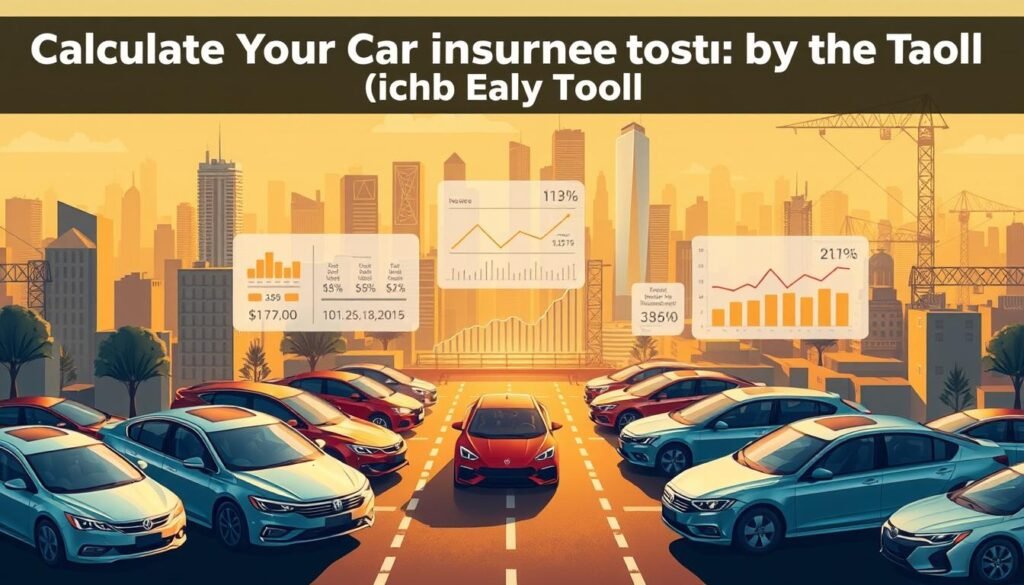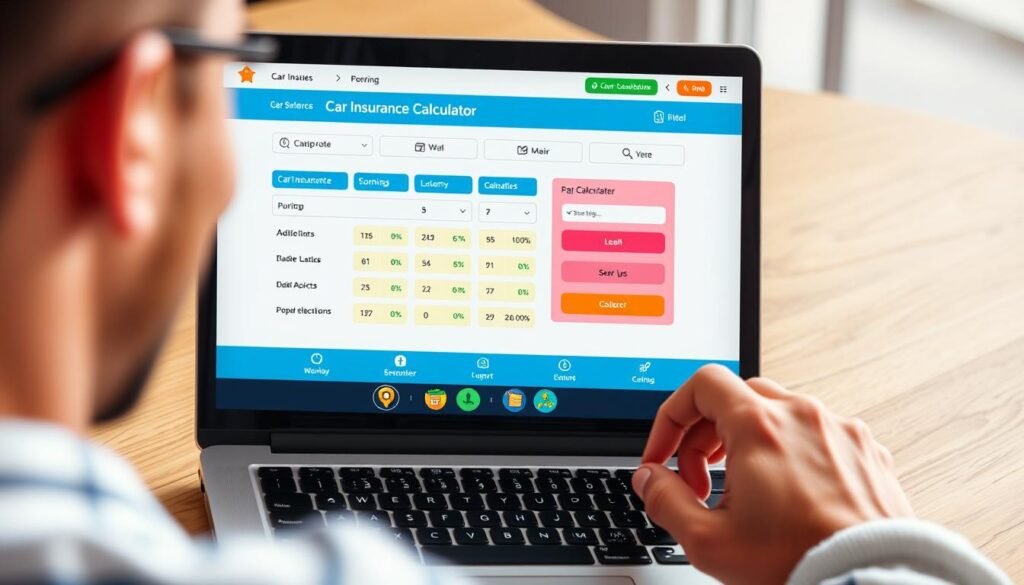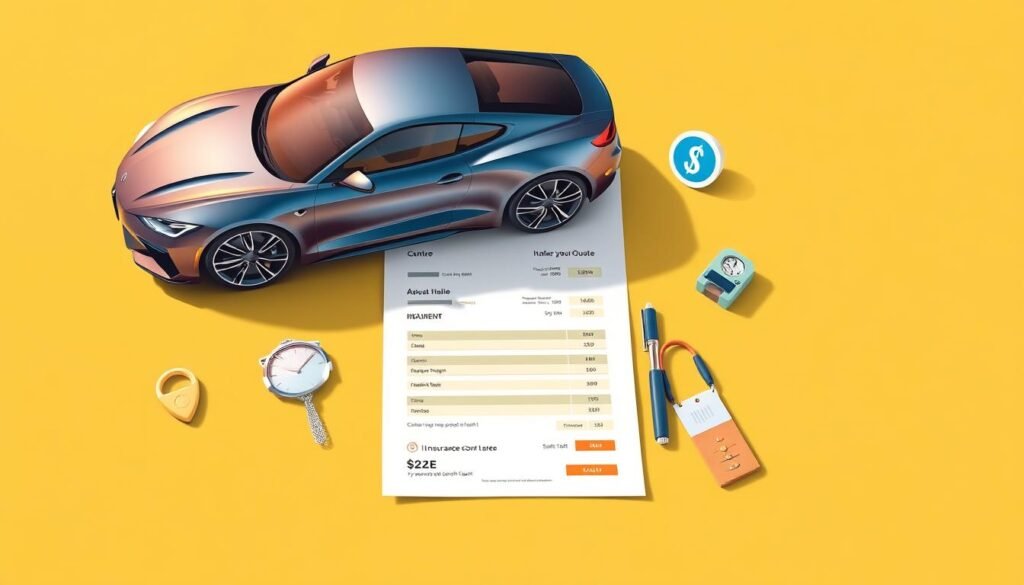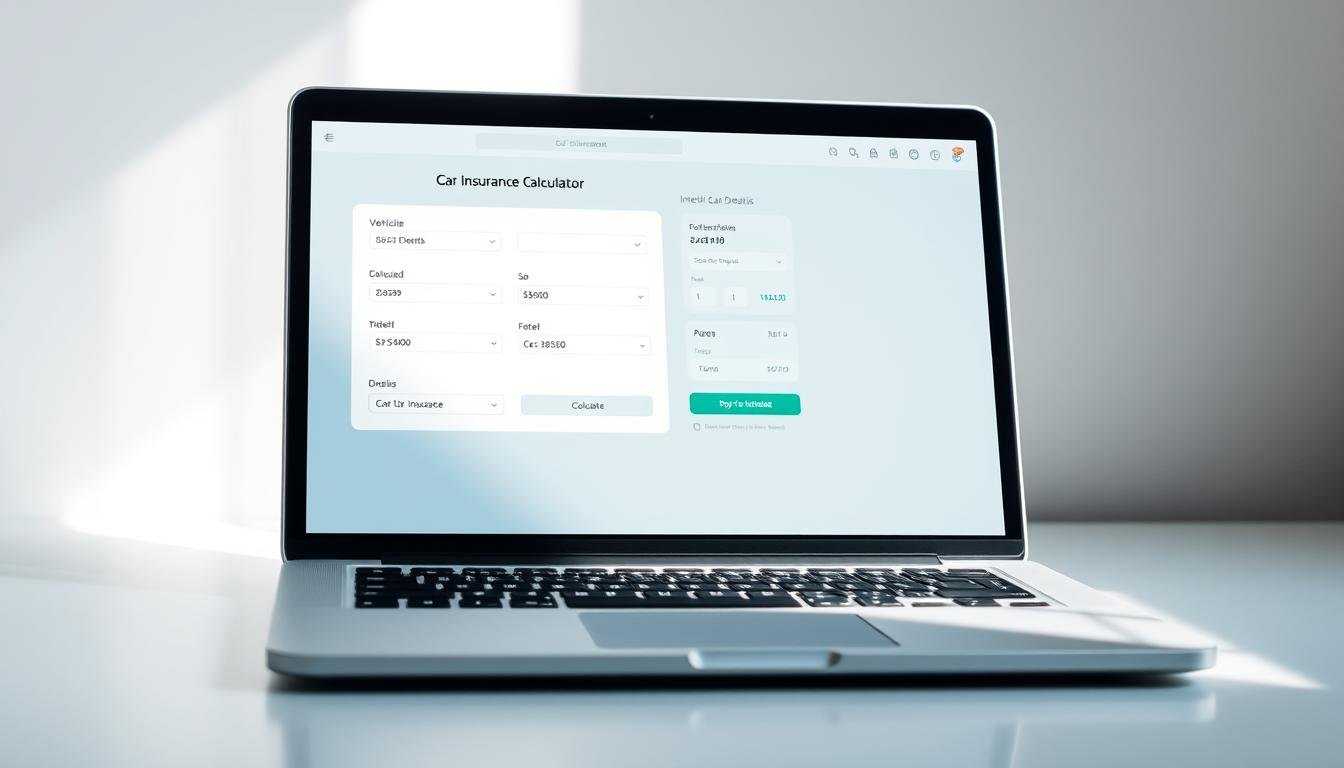Did you know that the cost of car insurance can vary by hundreds of dollars depending on the vehicle and your insurance company, even if your driver profile and insurance needs remain the same? Many car shoppers overlook this crucial factor when making a purchase decision.
Using a car insurance calculator before buying can help you avoid overpaying. Our tool provides a quick and easy way to estimate your car insurance rates based on your personal information, vehicle details, and coverage preferences.
Understanding your potential insurance costs is crucial when budgeting for a new vehicle. The national average for full coverage car insurance is $2,294 per year, but your rates will differ based on your specific circumstances.
Key Takeaways
- Estimate your car insurance rates before making a purchase decision.
- Understand how different factors affect your insurance costs.
- Use our car insurance calculator to compare coverage options.
- Learn how changes to your policy might affect your premium.
- Discover key factors that insurance companies consider when calculating your rates.
Understanding Car Insurance Rates
Understanding your car insurance rates is crucial for making informed decisions when purchasing a vehicle. Car insurance premiums are regulated by the states, but the provider isn’t obligated to give you the best deal, only a fair price.
Calculating the average cost of auto insurance is a combination of the car you drive and your persona. Your age, location, credit score, and driving history all factor into the equation.
Why Car Insurance Rates Vary
Car insurance rates vary widely based on multiple factors, including your personal demographics, driving history, and the vehicle you choose to insure. Insurance companies use complex algorithms to assess risk levels and determine appropriate premiums for each individual driver.
- Your location plays a significant role in your insurance costs, with urban areas typically having higher rates due to increased accident and theft risks.
- Many drivers are surprised to learn that their credit score can significantly impact their insurance rates in most states.
- The make and model of your vehicle directly affects your premium, with luxury and high-performance cars typically costing more to insure.
The Importance of Calculating Insurance Costs Before Buying a Car
Understanding how insurers calculate rates can help you make more informed decisions when shopping for both vehicles and insurance policies. Calculating potential insurance costs before purchasing a vehicle can help you avoid budget surprises and make a more financially sound decision.
By considering these factors, you can better understand how your car insurance rate is determined and make choices that help lower your premiums.
Our Insurance Car Calculator: How It Works

Discover the simplicity of determining your car insurance costs with our intuitive insurance car calculator. This tool is designed to provide you with accurate estimates, helping you make informed decisions when purchasing a vehicle. By considering various factors that influence your insurance rates, our calculator gives you a comprehensive view of the costs involved.
To get the most out of our calculator, it’s essential to understand how it works and what information you’ll need to provide.
Step-by-Step Guide to Using Our Calculator
Using our car insurance calculator is straightforward. Here’s a step-by-step guide:
- Our insurance car calculator is designed to be user-friendly, allowing you to input your information and receive accurate estimates in just minutes.
- The calculator takes into account numerous variables including your age, driving history, location, vehicle details, and desired coverage levels.
- The tool will guide you through selecting appropriate coverage types and limits based on your specific needs and state requirements.
- Our calculator allows you to compare multiple scenarios side-by-side, helping you understand how different vehicles or coverage options affect your rates.
Information You’ll Need to Get Started
To use our insurance car calculator effectively, you’ll need to provide some basic personal and vehicle-related information. This includes:
- Your ZIP code, age, marital status, and details about your driving record.
- Details about the vehicle you’re interested in, such as its make, model, and year.
- Information about your desired coverage levels and types.
By having this information ready, you can quickly and easily get an accurate estimate of your car insurance costs. Our calculator is designed to be efficient and user-friendly, ensuring that you can make informed decisions about your car purchase and insurance coverage.
Key Factors That Affect Your Car Insurance Rates
To get the best car insurance rates, it’s essential to understand the various factors that insurance companies consider when calculating premiums. Your car insurance rate is not arbitrary; it’s based on a complex assessment of multiple elements that determine your risk profile as a driver.
Driver-Related Factors
Several personal characteristics and driving habits play a significant role in determining your car insurance rates. Understanding these factors can help you make informed decisions to potentially lower your premiums.
Age and Driving Experience
Your age and driving experience significantly impact your car insurance rates. Younger drivers, particularly teenagers, typically face higher rates due to their higher statistical risk of being involved in accidents. As you gain more driving experience and mature, your rates are likely to decrease, reflecting your reduced risk profile.
Driving Record and Claims History
A clean driving record is one of the most effective ways to maintain lower car insurance rates. Any history of accidents, traffic violations, or claims can increase your premiums for several years. Insurance companies view drivers with a history of incidents as higher risk, leading to higher rates.
Credit Score Impact
In most states, your credit score can affect your car insurance rates. Drivers with higher credit scores typically qualify for lower premiums, as they are considered more financially responsible and less likely to file claims. Maintaining a good credit score can be a valuable strategy for reducing your insurance costs.
Vehicle-Related Factors
The type of vehicle you drive also plays a crucial role in determining your car insurance rates. Different make and model considerations, as well as the vehicle’s age and value, all contribute to your overall insurance cost.
Make and Model Considerations
Insurance companies maintain extensive databases on various vehicle models, tracking their safety records, repair costs, and theft statistics. Make and model considerations can significantly impact your premiums. For instance, luxury or high-performance vehicles typically cost more to insure due to their higher value and the increased risk of being driven at higher speeds.
Vehicle Age and Value
The age and value of your vehicle affect your insurance rates in complex ways. Newer vehicles may cost more to insure due to their higher replacement costs, but they often come equipped with advanced safety features that can reduce the risk of accidents or injuries. Older vehicles, while less expensive to replace, may lack modern safety features, potentially increasing certain types of claims.
Safety Features and Theft Statistics
Vehicles equipped with advanced safety features may qualify for discounts on car insurance, as these features can reduce the severity of injuries and the likelihood of accidents. Additionally, theft statistics for your vehicle’s make and model can influence your rates. Vehicles with higher theft rates typically cost more to insure.
For more detailed information on how these factors affect your car insurance rates, you can visit Bankrate’s comprehensive guide. Understanding these elements can help you make informed decisions to potentially lower your car insurance rates over time. You can also check out this article for tips on getting the lowest car insurance rate.
Types of Coverage to Consider
To build a comprehensive car insurance policy, you need to understand the various types of coverage available. Car insurance policies typically offer a range of options, each designed to address specific risks and needs. By understanding these options, you can create a policy that adequately protects you without unnecessary expenses.
Liability Coverage Explained
Liability coverage is the foundation of any auto insurance policy. It covers damage you cause to others, including both bodily injury and property damage. Most states require a minimum amount of liability insurance, but getting only the required amount may leave you underinsured. Consider higher limits based on your personal financial situation to ensure you’re fully protected.
Comprehensive and Collision Coverage
If you drive a newer car, consider getting comprehensive and collision coverage, also known as “full coverage.” Comprehensive coverage protects against non-collision incidents like theft, vandalism, and weather damage. Collision coverage pays for damage to your vehicle after an accident, regardless of who’s at fault. This coverage is essential for newer or more valuable vehicles.
Additional Coverage Options
Additional coverage options like uninsured/underinsured motorist protection, medical payments, and gap insurance provide extra layers of security for specific situations. These coverages can help protect you from financial losses in the event of an accident or other damage. For more information on choosing the right insurance provider, visit this resource.
How Coverage Choices Affect Your Premium
The coverage choices you make directly impact your premium. Higher limits and additional coverages increase your costs but provide greater financial protection. Our car insurance calculator helps you understand the cost implications of different coverage combinations, allowing you to make informed decisions about your policy structure.
Location-Based Insurance Considerations

Location is a key factor that insurance companies consider when calculating your car insurance rates. Your geographical location can significantly influence the cost of your insurance due to various regional factors.
State Minimum Requirements vary across the United States. Most states require a minimum amount of car insurance, but these minimums can differ substantially. For instance, some states operate under “no-fault” insurance systems, which can result in higher average premiums. Understanding these requirements is crucial when determining your insurance costs.
State Minimum Requirements
Each state sets its own minimum insurance requirements, affecting base premium levels. It’s essential to familiarize yourself with your state’s specific requirements to ensure you’re adequately covered.
How Your ZIP Code Influences Rates
Your ZIP code provides insurers with critical data about local crime rates, claim frequencies, and traffic conditions, directly impacting your insurance rates. Urban areas tend to have higher rates than rural areas due to increased traffic density and theft risk.
- Crime rates and claim frequencies in your area can increase or decrease your insurance rates.
- Urban areas generally have higher insurance rates compared to rural areas.
- Enter your ZIP code to find the average monthly car insurance rate for your area.
Our calculator incorporates location data to provide accurate estimates based on where you live, helping you understand how your address affects your insurance costs.
How Different Vehicles Affect Insurance Costs
Different vehicles have varying insurance costs due to several factors. The make and model of your car, its value, and even its safety features all play a role in determining your insurance premiums.
Understanding Vehicle-Specific Factors
Insurance companies consider various factors when calculating premiums for different vehicles. These include the vehicle’s retail price, cost of parts, safety record, and statistical risk factors such as theft and accident rates.
Luxury vs. Economy Cars
Luxury vehicles typically cost more to insure than economy cars. This is because luxury cars are often more expensive to repair or replace, and they may be more attractive to thieves. Additionally, luxury cars may have advanced features that, while improving safety, can be costly to fix if damaged.
For instance, high-end models often use specialized parts made from materials like carbon fiber, which are expensive. On the other hand, economy cars are generally cheaper to repair and replace, resulting in lower insurance premiums.
SUVs vs. Sedans vs. Sports Cars
The type of vehicle you own also affects your insurance rates. SUVs, sedans, and sports cars each have different insurance profiles. SUVs, for example, may have a higher risk of rollover, which can impact their insurance costs. Sedans are often considered safer and may have lower premiums. Sports cars, however, are typically more expensive to insure due to their association with higher speeds and a greater likelihood of accidents.
Insurance companies maintain extensive databases that track the claim histories of different vehicle models, allowing them to precisely calculate risk based on real-world data.
Electric and Hybrid Vehicle Considerations
Electric and hybrid vehicles present unique insurance considerations. While they may offer savings on fuel and potentially lower maintenance costs, their expensive battery systems can increase repair costs. Some insurers may charge higher premiums for these vehicles due to the specialized repair needs and the high cost of replacing battery packs.
However, many electric and hybrid vehicles come equipped with advanced safety features, which can lead to discounts on insurance premiums. It’s essential to factor these considerations into your decision when choosing a vehicle.
- The vehicle you choose has a significant impact on your insurance costs, with factors such as vehicle type, value, and repair costs playing a crucial role.
- Luxury vehicles are more expensive to insure due to higher purchase prices and costly specialized parts.
- Sports cars command higher insurance premiums due to their correlation with more frequent and severe accidents.
- Our calculator incorporates vehicle-specific data to provide accurate estimates for different makes and models.
Tips to Lower Your Car Insurance Rates

Lowering your car insurance rates can be achieved through various strategies that don’t compromise on essential coverage. If you’ve been with the same insurance company for many years, your rates might not be competitive. Auto insurance premiums are regulated by states, but providers aren’t obligated to offer the best deal, only a fair price. This makes it essential to review and adjust your policy regularly.
Discounts You May Qualify For
Many drivers qualify for discounts they’re not aware of. These can include safe driver discounts, good student discounts, professional organization memberships, and vehicle safety feature discounts. It’s crucial to inquire about available discounts when reviewing your policy or shopping for new insurance.
- Safe driver discounts for maintaining a clean driving record
- Good student discounts for students with excellent academic performance
- Professional organization memberships that offer insurance discounts
- Vehicle safety feature discounts for cars equipped with advanced safety features
Bundle and Save Strategies
Bundling multiple policies, such as home and auto insurance, with the same company can result in significant savings on both policies. This strategy is an effective way to reduce your overall insurance costs.
The Impact of Deductible Choices
Adjusting your deductible is a direct way to lower your premium. However, it requires careful consideration of your financial ability to pay that amount in the event of a claim. A higher deductible can lead to lower premiums, but you’ll need to ensure you can afford the deductible amount.
By implementing these strategies and regularly reviewing your policy, you can enjoy lower car insurance rates without compromising on essential coverage. Our calculator can help you experiment with different coverage combinations and deductible levels to find the optimal balance between protection and affordability.
When to Recalculate Your Car Insurance
It’s essential to reassess your car insurance periodically to ensure you’re getting the best rates. Your insurance needs and eligibility for better rates change throughout your life, making regular recalculation of your car insurance an important financial practice. As circumstances change, your car insurance policy should adapt to provide the most appropriate coverage at the best possible rate.
Life Events That Affect Your Rates
Major life events should trigger an immediate review of your insurance situation. Events such as marriage, moving, buying a home, improving your credit score, or adding a teen driver can significantly impact your car insurance rates. For instance, getting married might qualify you for a multi-car discount if you and your spouse insure your vehicles together. Conversely, adding a teen driver could increase your rates due to the higher risk associated with inexperienced drivers.
As your vehicle ages, the optimal coverage mix may change. You might consider dropping comprehensive and collision coverage on older, less valuable cars to save on premiums. This adjustment can help ensure you’re not paying more for coverage than the vehicle is worth.
- Review your policy upon significant life changes to adjust your coverage accordingly.
- Consider the age and value of your vehicle when deciding on comprehensive and collision coverage.
- Take advantage of potential discounts resulting from life changes, such as marriage or homeownership.
Annual Review Benefits
Even without major life changes, an annual insurance review is recommended. This practice ensures you’re still getting competitive rates and appropriate coverage. Insurance companies regularly adjust their rating algorithms and discount structures, meaning the company that was cheapest for you previously may not be the best option now.
Using our insurance car calculator makes it easy to update your information and see if your current rates are still competitive in today’s market. As driving habits change, such as during retirement or when working remotely, your insurance needs and eligibility for usage-based discounts may also change. Regularly reviewing your policy can help you capitalize on these changes and potentially lower your car insurance rates.
Why Our Insurance Car Calculator Stands Out

What sets our insurance car calculator apart is its comprehensive approach to data collection and analysis, providing you with exceptionally accurate estimates. Unlike basic online calculators that provide rough averages, our tool incorporates data from multiple major insurance providers to generate personalized quotes.
Accuracy and Reliability Features
Our calculator’s algorithms are regularly updated to reflect the latest rating factors and discount opportunities used by insurance companies. This ensures that the information you receive is not only accurate but also relevant to your specific situation. By considering various factors that affect your car insurance rates, we provide a more precise calculation than generic calculators.
The accuracy of our calculator is further enhanced by its ability to account for different types of coverage and insurance coverage options. This allows you to make informed decisions about your car insurance policy.
User-Friendly Interface
We’ve designed our calculator with user experience in mind, creating an intuitive interface that guides you through the process without using complex insurance jargon. The tool provides educational information alongside your quotes, helping you understand how different factors affect your rates and what you can do to lower them.
Our car insurance calculator allows you to save multiple scenarios and return to them later, making it easy to compare different vehicles or coverage options over time. The responsive design works seamlessly across all devices, allowing you to start a quote on your phone and finish it on your computer if desired.
Calculate Your Personalized Car Insurance Quote Today

Unlock your customized car insurance quote today and make informed decisions about your auto insurance. Our easy-to-use calculator provides you with valuable information to understand your insurance costs better.
With our tool, you can get your personalized car insurance quote in just minutes. Here are some benefits you can expect:
- Getting your personalized car insurance quote takes just minutes with our easy-to-use calculator, providing you with valuable information to make informed decisions.
- Our tool asks targeted questions about your driving history, vehicle details, and coverage preferences to generate the most accurate estimates possible.
- You’ll receive side-by-side comparisons of different coverage options, helping you understand the cost implications of various policy structures.
- The calculator provides recommendations based on your specific situation, highlighting coverage options that might be particularly important for your circumstances.
- Unlike getting quotes directly from insurers, our calculator doesn’t require you to provide contact information that might lead to unwanted sales calls.
- The estimates include potential discounts you may qualify for, giving you a realistic picture of your likely costs.
- You can experiment with different deductible levels and coverage limits to find the perfect balance between protection and affordability.
- After calculating your estimate, you’ll have the option to connect directly with insurance providers to finalize your policy if you find an option that meets your needs.
Our goal is to empower you with the information you need to make the best decisions about your car insurance without any pressure, allowing you to proceed at your own pace.
Conclusion
Empowered with the right information, you can confidently choose the right car insurance coverage for your needs. Our insurance car calculator provides a valuable tool for understanding and estimating your car insurance costs before making important vehicle and coverage decisions.
By taking the time to calculate your potential rates, you gain the power to budget accurately and avoid financial surprises down the road. Different vehicles, coverage options, and personal factors all play important roles in determining your final premium, making personalized calculations essential.
Regular recalculation of your insurance needs as your life circumstances change ensures you maintain optimal coverage at competitive rates. Take advantage of our free tool today to gain insights into your insurance options and make confident, informed decisions about your car insurance.
